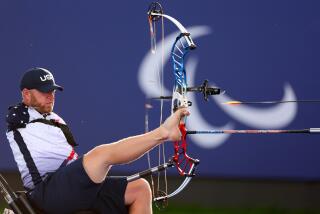Blind Power Lifters See Way to Championships
- Share via
VANCOUVER, Wash. — Lisa Garcia will never see her fingers grasping the weight above her body, never see her straining arms or her teammates cheering her on.
But the 14-year-old girl from Castle Rock isn’t letting that stop her from setting state and world records for her age group in the bench lift as part of the power lifting team at the Washington State School for the Blind.
“A lot of people say blind people can’t lift,” Garcia said. “That’s the silliest thing I’ve ever heard.”
Twenty-one middle and high school students make up the nation’s only team of power lifters from a school for the blind. But that hasn’t stopped them from competing and setting records.
“They start realizing they’re doing something not everybody can do,” coach Robb Peck said. “All their lives they have been told they can’t do something everybody else can. They can’t see.”
The Washington State School for the Blind in Vancouver, about 10 miles north of Portland, Ore., has nearly 80 students from kindergarten through 12th grade.
Before wrestling came along, there were no real sports teams, leaving some students feeling that their school was too much like an institution. Power lifting became the only organized sport at WSSB in 1993 when three students thought that’s what it would take to make it feel like a real school, Peck said.
Peck, who learned how to lift through magazines and by befriending “the guy in the gym with the biggest chest,” quickly discovered some untapped talent.
On a whim, he took his novice team to the national championships of the 1993 U.S. Assn. of Blind Athletes. One student took first place in his weight division and was invited to compete in the International Blind Powerlifting Federation World Championships in Spain.
“To me, it was the most positive thing that ever happened in my whole life at that time,” said Nov Gnik, now 26, who continues to volunteer as a team trainer.
Power lifting has three basic lifts: the squat, in which lifters hold a bar behind their head while squatting down before rising to a stand; the bench press, in which lifters lie on their back and lower and raise a bar; and the dead lift, in which lifters raise a weight from the floor to hip level with their arms.
At each event, competitors enter divisions based on their age, sex and weight.
Peck, who also has become the coach for the U.S. and Northwest Assn. of Blind Athletes, closely watches students to be sure they have the proper form, but students say their lack of sight doesn’t really matter.
“It’s not a visual thing,” said Ryan Ford, 17, of Belfair. “I don’t think it hinders us whatsoever.”
To prove it, the team has 72 state records, 26 regional records, 19 national records and 16 world records for the past eight years. The world records are spread among four power lifting federations: the World Assn. of Benchers and Dead Lifters, USA Powerlifting, U.S. Powerlifting Federation and the International Powerlifting Federation--all of which are not exclusive to blind athletes.
Students are comfortable moving around the weight room, but working together is vital. Those with limited vision act as guides and spotters for blind teammates, and they set up the correct weights for each other.
“As part of the team, you are just a piece of the puzzle,” Garcia said.
Students compete against a few high school teams, but mostly individuals and teams from gym clubs, Peck said. Meets tend to be small and are rarely restricted to blind lifters.
“It’s great because the first half hour, people will say, ‘Oh my god, look at all those visually impaired power lifters,’ but after the last hour, they will just look at them as power lifters,” says Charlie Huebner, executive director of the U.S. Assn. of Blind Athletes.
Peck’s lifters have a reputation for turning somewhat serious matches into theatrical events with World Wrestling Federation-like antics, says Gus Rethwisch, president of the World Assn. of Benchers and Dead Lifters.
“His team just rocks the place,” Rethwisch said. “His team and his fans make more noise than the rest of the crowd put together.”
Even during practice, the students let out yodels during their lifts and stop to yell out encouraging words to each other.
Peck has high expectations for his power lifters. Varsity members are required to attend a vigorous 6 a.m. practice five days a week. Students are also required to raise funds to attend local and state meets, which could potentially lead to national and world competitions.
“Being a student athlete is a privilege, not a right,” Peck said. “You have to go above and beyond.”
The team is doing just that.
At the World Assn. of Benchers and Dead Lift Championships regional meet in early March, additional honors were collected. The 22-member team took the overall team trophy, 31 first places and eight second places, set seven state records and one national record.
And the USA Powerlifting (USAPL) Oregon state championships and the USAPL Washington state championships were still on the horizon.
“It’s hard work, but it’s worth it when you win some trophies,” says Bryan Huffer, 12, who this season collected a first-place win, his first, in the bench press and the dead lift.
*
Washington State School for the Blind: https://www.wssb.org/powerlifting
World Assn. of Benchers and Dead Lifters: https://www.wabdl.org
United States Assn. of Blind Athletes: https://www.usaba.org
More to Read
Go beyond the scoreboard
Get the latest on L.A.'s teams in the daily Sports Report newsletter.
You may occasionally receive promotional content from the Los Angeles Times.






